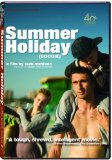| Reviews & Columns |
|
Reviews DVD TV on DVD Blu-ray 4K UHD International DVDs In Theaters Reviews by Studio Video Games Features Collector Series DVDs Easter Egg Database Interviews DVD Talk Radio Feature Articles Columns Anime Talk DVD Savant Horror DVDs The M.O.D. Squad Art House HD Talk Silent DVD
|
DVD Talk Forum |
|
|
| Resources |
|
DVD Price Search Customer Service #'s RCE Info Links |
|
Columns
|
|
|
Summer Holiday
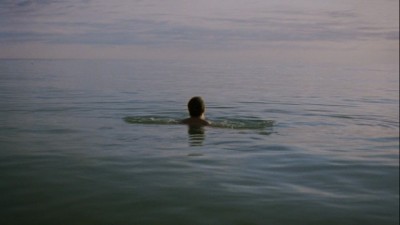
It may sound like a recipe for cliché, convention, and self-indulgence, a film about the conflicts and troubles of a successful young man in his late 20s whose increasingly committed relationship, impending second-time fatherhood, and the obligatory acknowledgment of adulthood that comes along with those circumstances leave him disoriented, doubtful, and defensive. But in the 2008 film Summer Holiday (originally entitled Boogie), the Romanian director Radu Muntean, who went on to make last year's beautifully crafted Tuesday, After Christmas, proves that with enough perspective, emotional astuteness, and cinematic vision, what could have been just another solipsistic, self-pitying straight-guy whine-fest can become instead a bracing, sensitive, and incisive look at the complexities and shifting ground that, for all of us, go inescapably with our relationships, whether familial, romantic, and platonic.
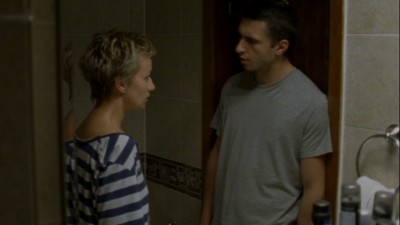
Dragos Bucur (so good in Corneliu Porumboiu's Police, Adjective) is Bogdan (or "Boogie"), a man in his early 30s who's on a Labor Day (May 1st) holiday with his longtime girlfriend, Smaranda (4 Months, 3 Weeks, and 2 Days's Anamaria Marinca), who's pregnant with their second child, and their toddler son, Adriean/"Adi" (Vlad Muntean). But the cracks that are starting to show in the relationship of this nouveau-yuppie couple (Boogie has built up a successful corporate/hotel furnishings enterprise) and their management of their burgeoning family only have additional unflattering light shed on them by the ostensible seaside escape. Their vacation which is also something of a disappointment because Romania's coastal-tourism industry is moribund, and their memories of a thriving resort town are belied by the dull tackiness of the slowly dying resort town they've come to. Smaranda's disapproval of Boogie's first act of youth-reclaiming recklessness, when he decides to wade out into the ice-cold ocean waters out of competitiveness with a younger man he's spotted doing the same, has nothing on her furiousness at being relegated to babysitter when the family has dinner with some old friends--Penescu (Tuesday, After Christmas's Mimi Branescu) and Iordache (Adrian Vancica)--of Boogie's that they've met by chance on the boardwalk and her mate decides to go out for a night on the town with his buddies from younger, wilder days while she heads back to their hotel room with the kid.
The bulk of the film is thus spent on Boogie's more down-to-earth version of the Eyes Wide Shut father/husband odyssey into a free-er but colder world, minus jealous wife and style-cramping child. Old rivalries and seams of tenderness arise between the friends as they drink to excess, go bowling, rib each other over their insecurities and then confess additional ones, and they end up in a hotel room with an amiable, slightly sardonic prostitute (Roxana Iancu) they've hooked up with. There is an interlude after his initial departure from Smaranda when he returns to their hotel room before angrily leaving once more, an extended scene that affords the actors the long-take opportunity for a beautifully played, distressingly familiar (to anyone who recognizes the kind of quicksand, Blob-like misunderstanding that can only arise between two people who live together and love each other) marital spat. (Tuesday, After Christmas also seemed to reference--and admirably acquit such boldness--Godard's Contempt to complement its own foray into Eyes Wide Shut territory, demonstrating not that Muntean is a copyist so much as that he has great taste and his own particular skill, vision, and inventiveness that far distinguishes his storytelling from mere displays of influence.)
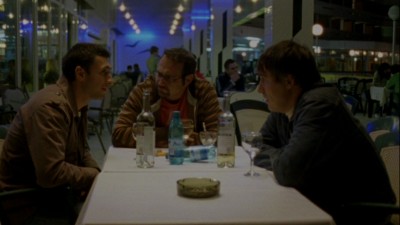
The way Muntean and co-screenwriters Razvan Radulesco (well-established with his contributions to many of the most outstanding in the recent wave Romanian films, e.g., The Death of Mr. Lazarescu) have woven an observant and sensitive social consciousness into their drama is something we see much of in contemporary Romanian cinema, and it's as impressively well-integrated here, if by necessity significantly more subtle, than in Mr. Lazarescu or 4 Months, 3 Weeks, and 2 Days. The setting itself--a rundown, crass former seaside utopia--along with the fact that it's the May 1st workers' holiday, which used to be the biggest deal of the year but is now a disappointing pseudo-break (which, with cell phones and laptops, doesn't even entail a real escape from work) point up--in the same manner Tuesday, After Christmas did, without a single raising of the authorial voice or moment of overemphasis or digressiveness--that, in a post-Communist vacuum there apparently isn't enough profit-mongering capitalism in the world to fill, material prosperity is revealed all too readily not to count for everything, and people (like Boogie's proud but desperate, less privileged friends, each of whom takes a surreptitious opportunity to beg him for a job) are still unfulfilled or find themselves unfairly left out and left behind.
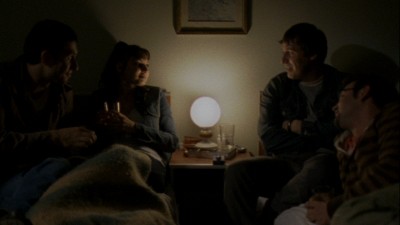
Muntean's technical style most directly recalls that of his Romanian-cinema compatriot 4 Months, 3 Weeks director Cristian Mungiu's coolly handheld, observational style, but in drawing out every possible sort of engagement and revelation from seemingly mundane situations and interactions, Muntean captures for himself some of the invisibly compressive magic Chantal Akerman made in Jeanne Dielman. The most salient way in which the auteur shines, however, is through his intense focusing of energy, both writing and shooting-wise, on developing, very convincingly drawing out, and involving us deeply in the emotional and psychological states of his characters. He writes astoundingly recognizable, human characters and draws superb performances from the actors; one gets the feeling that everybody involved would sooner die than be caught inserting or speaking some clumsy bit of expository dialogue when they could much more effectively find the clues to who's feeling what and why through much more refined nuances of dialogue, delivery, body language, and visual composition. Even amongst his near-uniformly excellent group of colleagues in the ever-exciting Romanian cinema, Muntean has marked out his own patch of ground, his own particularly well-honed patch of writing/directing ground that is over and beyond the fine dramatic and visual sense of craft he shares with the others. This has everything to do with his prioritizing of emotion in every frame, his ability to realize that "little" moments can be make-or-break for our self-identity and our relations with others and convey that insight with such subtle yet decisive articulation on film. If Muntean continues to develop and demonstrate the immense gift he evinces here and in Tuesday, After Christmas, the Romanian New Wave will have a Bergman-level master of psychology and emotion to call its very own.
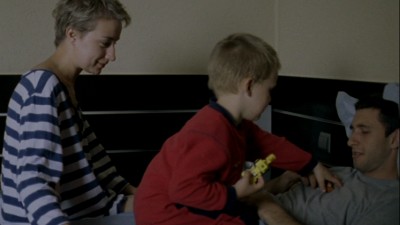
THE DVD:
The anamorphic 1.78:1 aspect-ratio transfer is very nicely done, capturing all the wondrously bold available-lighting-dependent magic and texture of cinematographer Turod Lucaciu's work. (Lucaciu went on to top himself with his work on Muntean's Tuesday, After Christmas.) The apparent slight overuse of digital noise reduction may be an issue for some, but I found enough celluloid texture left intact to be reasonably satisfied.
Sound:The Dolby Digital 2.0 soundtrack is very nicely presented, conveying the film's restrained but quietly multilayered sound design to its fullest extent. (A slight occasional oddity in the sound, with which some scenes' dialogue sounds a bit differently/slightly more loudly recorded or possibly post-synced, seems more like a minor anomaly in the film's sound than anything to do with its transfer to DVD.)
Extras:Nothing save for the U.S. theatrical trailer, which is one of those horrible narrated-in-English, edited-into-unrecognizability trailers for foreign films that goes far out of its way to make it look much, much cheesier and more conventional than it actually is. (IFC Films has a bad history of pulling this kind of thing with their trailers--e.g., but we forgive them because they are, in the end, making some excellent films available to us.)
FINAL THOUGHTS:Like his more recent film, Tuesday, After Christmas, Radu Muntean's Summer Holiday, the story of a young man's crisis of lost youth when faced with the discomfiting evidence of an impending life of adult responsibility, packs enough of an emotional punch through its incredibly insightful, well-conceived writing and subtly, minutely observant approach to image-making and acting to give even Bergman a run for his money. Such an accomplished film kept so committedly on so human a level is a gift, pure and simple; even though we have already had an embarrassment of such riches given to us by the miraculous new Romanian cinema, they seem to just keep coming, and we can happily add Summer Holiday to that heartening list of flat-out excellent, deeply engaging, worthwhile pinnacles of dramatic inspiration and restrained, sublime visual and performative artistry. Highly recommended.
|
| Popular Reviews |
| Sponsored Links |
|
|
| Sponsored Links |
|
|
| Release List | Reviews | Shop | Newsletter | Forum | DVD Giveaways | Blu-Ray | Advertise |
|
Copyright 2024 DVDTalk.com All Rights Reserved. Legal Info, Privacy Policy, Terms of Use,
Manage Preferences,
Your Privacy Choices | |||||||









